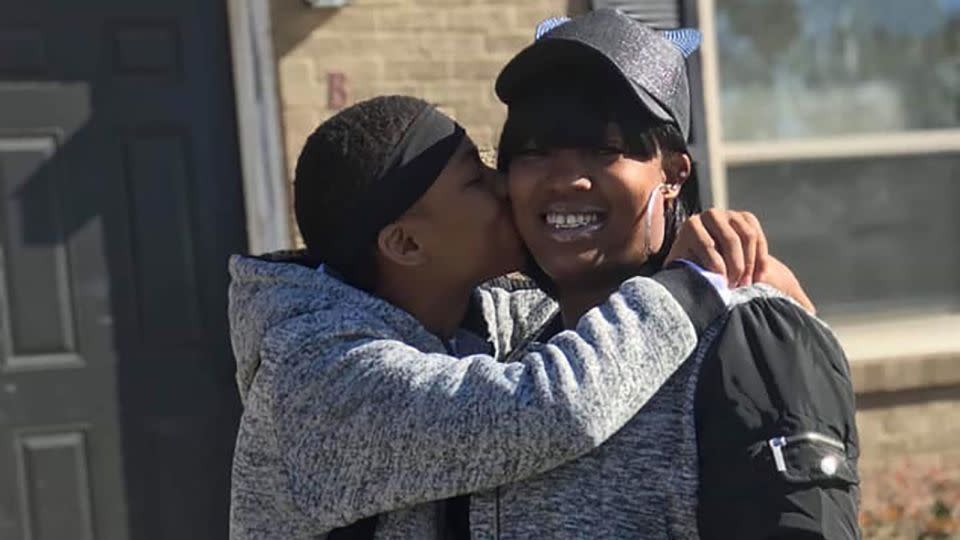Anti-LGBTQ bills in Alabama’s legislature threaten the state’s youth and undermine one gay teenager’s legacy, critics say
Editor’s Note: If you are in the US and you or a loved one have contemplated suicide, call the National Suicide and Crisis Lifeline at 988 or 1-800-273-TALK (8255) to connect with a trained counselor. Outside the US, a worldwide directory of resources and international hotlines is provided by the International Association for Suicide Prevention, and you can turn to Befrienders Worldwide.
Camika Shelby says 2019 was the worst year of her life.
“Never in a million years did I think I would pull up at home and find my child lifeless,” Shelby told CNN. Her only child, Nigel, died by suicide on April 18 that year. He was 15.
Nigel was gay, Shelby said, but she never knew the impact that had on his life at school. She didn’t find out until the Huntsville City Board of Education opened an investigation into Nigel’s death – and what she learned prompted Shelby to sue the board and an administrator at Nigel’s school.
Nigel was continuously bullied by his classmates both online and in-person for being gay – in some instances, even in front of faculty members, according to the civil lawsuit, filed in 2021. Nigel and his friends had reported the harassment Nigel was experiencing multiple times, but he was treated as “a joke” and brushed off as just having an “episode” by the lead administrator for freshman, according to the lawsuit.
“The district’s lack of adequate policies and training significantly harmed Nigel and placed him at unreasonable risk of harm,” the suit stated. “And, now, Nigel is gone.”
It’s a worry for many that is growing: Now advancing throughout the Alabama legislature are a series of bills that would slowly chip away the rights of the LGBTQ community, including by limiting LGBTQ discussions in classrooms.

Shelby ultimately reached an $840,000 settlement with the board and administrator, under which the board agreed to update policies on anti-bullying and harassment toward the LGBTQ community as well as teaching faculty and students ways to prevent bullying and harassment towards LGBTQ people. The board and administrator denied violating any legal duty, rights or “federal, state, or municipal constitution, law, order or regulation.”
“It’s our job to make kids feel safe,” Shelby said. “As a parent, any parent, whether your child is LGBTQ or not, no parent wants to worry about their child going to school with something happening.”
The proposed legislation comes as Alabama has already sparked contention over an anti-diversity, equity and inclusion (DEI) law that prohibits public schools and universities from maintaining or funding DEI programs, and a top court ruling that fertilized embryos are children, which effectively shuttered in-vitro fertilization in the state until lawmakers passed a bill protecting the procedure.
The anti-DEI law, which was enacted in late March, also requires public universities to “designate restrooms on the basis of biological sex” — which Alabama law defines as “the physical condition of being male or female, as stated on the individual’s original birth certificate” — and not the gender that aligns with how a person identifies.
‘Solutions in search of a problem’
HB130 – dubbed a “Don’t Say Gay” bill by critics – is one of the bills currently working through the state legislature. It intends to broaden a 2022 law that limits discussions about LGBTQ topics for public K-5 classrooms to K-12. The legislation bans classroom instruction for public school students “related to gender identity or sexual orientation.”
HB130 would also remove the current language that teaching LGBTQ topics “in a manner that is not age appropriate or developmentally appropriate for students in accordance with state standards” is okay for educators, which in turn expands the scope of what isn’t allowed to be discussed in the classroom.
For Neil Rafferty, a husband, combat veteran and the only Alabama state lawmaker who identifies as gay, the changes could once again trigger unintended consequences for the state.
“There becomes this ambiguity with it that then goes down to the school districts to try to figure out how to comply with this (possible new law),” Rafferty, whose bookshelf has a Bible beside Alabama state code books, said. Even saying something like “Amelia Earhart was the first woman to fly across the Atlantic” could become problematic in classrooms, he said.
Rafferty questioned Republican lawmakers’ motivation for the bill. “Essentially these are solutions in search of a problem,” the Democrat told CNN.

The bill would also ban pride flags and LGBTQ insignias from being displayed in classrooms or on school grounds. Although it does not currently define any punishments for displaying LGBTQ insignias, the bill leaves it to the state board of education to dole out policing and punishment in these matters.
The bill’s author and sponsor, Republican Rep. Mack Butler, said the bill’s purpose is for schools to “focus on reading, writing and arithmetic.”
“There is some indoctrination going on,” Butler said at a state House Education Policy committee meeting earlier this month. “We are destroying the family in teaching something of these things. Let it happen somewhere else other than our schools … all it is seeking (is) to purify the school a little bit.” Butler later said he misspoke when talking about the need to “purify” but did not expand on his comments.
CNN reached out to the sponsors of HB130, who are all Republicans. None responded to CNN’s questions about the bill or were available for an interview.
In an interview with AL.com, Butler said the restrictions are to protect children’s innocence. “[Teachers] are infringing on the parents’ space” by teaching about gender or sexual orientation, Butler told the outlet.
In addition to HB130, the legislature is considering HB111 and SB92: companion bills that would legally determine what gender is, that the only sexes are male and female, and the gender on your birth certificate must correlate “wherever state law classifies individuals on the basis of sex” if signed into law.
The legislature convenes again on Tuesday.
Alabamans broadly support some LGBTQ rights, data shows
Shelby questions how the bills will benefit Alabamans of all ages.
A majority of Alabamans support same-sex marriage and anti-discrimination laws for LGBTQ people, according to 2022 data from the Public Religion Research Institute. That same research shows respondents are split when it comes to allowing businesses to refuse service for LGBTQ customers.
“If these bills go into play, what was I actually fighting for?” Shelby said. “We all deserve protection. We all deserve to feel comfortable. We all deserve to feel love. So, my question is, who are these bills actually protecting? Because obviously it’s not parents of my situation. It’s not kids of Nigel’s situation.”
Adele Kimmel, Director of Public Justice’s Students’ Civil Rights Project, which represented Shelby, also expressed concerns about the way the bills are worded and how “unconstitutionally vague” they are.
Kimmel said she believes they could make students “less likely to report” any bullying or harassment, like what Nigel faced.
“That would create a hostile learning environment for LGBTQ students and would likely cause significant trauma for them, since the bills target them and will make them feel unwelcome at school,” Kimmel told CNN. “And since the whole purpose of the Shelby settlement, and all of these terms about policies and training and procedures is to make sure that LGBTQ students feel safe and welcomed and included at school.”
A similar “Don’t Say Gay” bill that banned certain instruction about sexual orientation and gender identity in the classroom was signed into law in Florida in 2022. Florida education officials and a group of LGBTQ advocates and families recently reached a legal settlement that clarifies the scope of the statute.
And Alabama and Florida are not alone in introducing such bills; according to the Human Rights Campaign, in 2023, state legislators introduced a record 520 anti-LGBTQ bills. Seventy were enacted – another record, the organization said.
Shelby grew up in Alabama and said she loves her state, just not the way people like her son are treated.
It’s been nearly five years since her son died.
After his death, Shelby started The Nigel Shelby Foundation to help youth who may not have a support system, provide scholarships for students and help families with LGBTQ children. She’s working to get a business degree. She wrote a book about her son.

In a letter to his mother before his death, Nigel asked her to forgive him and keep living, Shelby said.
“He said, ‘Mama, please keep going,’” Shelby said. “So, for me to just give up … it would feel like I was letting him down.”
“He’s no longer here, but there’s still a million of (youth like) him that is here, and it does affect them,” she said. “I wouldn’t wish this on anybody. So, if there is something that I can do to prevent this from happening to the next person, that’s what’s worth fighting for.”
For more CNN news and newsletters create an account at CNN.com


